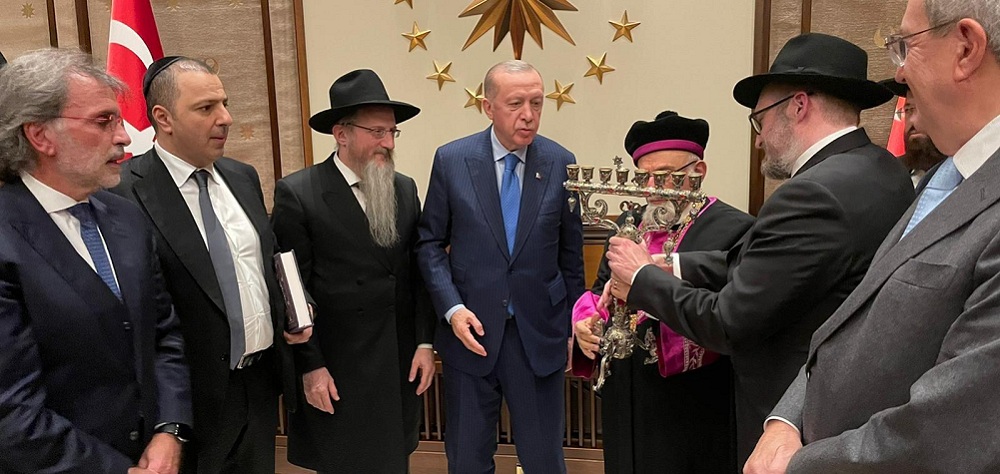Alwaght- On Wednesday, Israeli newspaper the Yedioth Ahronoth reported a visit to Turkey of the Israeli Foreign Ministry Director-General Alon Ushpiz in preparation for next month visit of the Israeli President Issac Herzog's visit to Ankara. His meeting with the Turkish presidential spokesman Ibrahim Kalin comes as earlier Turkish President Recep Tayyip Erdogan had said that the Israeli president would travel to Turkey in early February. Many political observers agree that as part of a de-escalation policy he has embarked on over the past months, Erdogan is normalizing with Tel Aviv.
From severing ties to bending over backward for normalization
The approach of Erdogan and other Turkish government officials clearly demonstrate that the Turkish leader is seriously seeking to normalize relations with Tel Aviv and maintain economic relations between the two sides. The new Turkish tendency comes as since 2018 and following stepped up Israeli attacks on Gaza and Trump relocation of American embassy from Tel Aviv to Al-Quds (Jerusalem), Turkey recalled its ambassador from the Israeli regime, triggering similar response from Tel Aviv.
Over the past two years, Erdogan has backed down from his aggressive and tense approach with various actors under a charm offensive, pursuing a strategy of de-escalating and normalizing relations with Arab countries and, more recently, the Israeli government. In addition to sending political signals, Erdogan has spoken of readiness to cooperate with the Israelis in all areas, including gas sector. On February 4, Erdogan said Turkey can use Israeli gas and cooperate with Tel Aviv to send it to Europe.
Erdogan's remarks are basically meant to defeat an anti-Turkish regional alliance. Turkey's gas exploration in the Mediterranean Sea in the past few years has brought Greece, Cyprus, Egypt and the Israeli regime under an anti-Turkish coalition. Even in 2018, Donald Trump supported EastMed Pipeline project which is aimed at transferring Israeli gas to Europe via Cyprus. But after Biden took office, support for the plan was quietly quitted, with new administration officials citing the project as a source of tension and instability in the region. Now Erdogan wants Turkey the only way through which the Israeli gas reaches Europe in a bid to break the opposite alliance.
Erdogan's paradoxical political actions
After 2009, Recep Tayyip Erdogan has repeatedly tried to portray himself as a supporter of the Palestinians and their cause and an ally of the resistance political groups, on top of them Hamas, in the occupied territories. He has even been aspiring to introduce himself as the leader of the Islamic countries in the Palestinian case. During various statements and meetings, he verbally attacked the Israeli regime. This trend culminated in 2018 and led to the severance of relations with Tel Aviv, but the fact is that Erdogan and ruling Justice and Development Party (AKP) have never been true allies of the Palestinian people.
In the current context, Erdogan has argued that his efforts to normalize relations with the Israelis do not mean turning his back on Palestinian groups, and that Ankara will continue to defend the rights of Muslims in the occupied territories. However, any friendship with the Israeli regime, actually, should be viewed as running counter to the interests of Palestine. Late last year, Erdogan invited the Jewish rabbis in Istanbul, signaling his efforts to persuade the Israeli lobby in the US to sway Biden policy for the good of Turkey. Therefore, in the normalization case, the claim of maintaining ties with the Palestinian resistance while engaging with the Israelis is a political propaganda and a deception of public opinion at home and abroad.
Erdogan and paying high price for normalization with Tel Aviv
A set of reasons may drive Erdogan's decision for détente with the Israelis, among them an aim to heal the economic crisis and also win support of the pro-Israeli lobbies to stay in power in next elections. But his new approach which is adopted using normalization can deliver the reverse and cost him and his party heavily.
Actually, now a large part of the Turkish society and also Muslim world public view any thaw with Tel Aviv an unforgivable betrayal of the Palestinian cause. If done, the normalization would harm Erdogan image at home and across the Muslim world— something potentially paving the way for AKP loss in next elections and foisting a heavy price on Erdogan and his political future.



























